Listen to this interview at the Mormon Women Project podcast, available on all platforms. This interview is part of our Mixed-Faith Marriage series.
Jennifer Kambourian is a lifelong member of the Church. At 42 years old she married John, a man of Catholic upbringing who had recently lost his first wife to cancer, leaving him to raise his three children. Coming from a part-member family herself, Jennifer had always been determined to marry a faithful Latter-day Saint man in the temple. But a revelatory process of prayer, fasting, temple attendance, and conversations with trusted friends led her to know she was meant to join this family and give her heart to raising the children and supporting them through their grief. Jennifer and her husband have been married twelve years, and she attributes their success to their mutual support of each other’s faith practices and respect for each other’s autonomy. She feels peace that the questions of eternity will be answered later, and that her current job is to love her family.
Tell me about yourself; where do you live and what do you do?
I am 55 years old and I live in Northern Virginia. I grew up in Central California in a part-member family. My mom was LDS all of her life. She met and married my father, who was not LDS, but he joined the Church very soon after their marriage. Within five or six years of his joining the Church, he came to believe that he had made a mistake and did not believe in the truth claims of the Church. So he asked to have his name taken off the records of the Church when I was a really little girl.
In my growing up years, essentially, I didn’t have an LDS dad. We grew up in a family of all daughters, so there was not a priesthood holder in our home. The good news was that my dad was really supportive of our family going to church. I think he saw the benefit to all of us that involvement in the Church provided. However, it was painful for me especially into my teens to experience my church life without a fully LDS family. Growing up in the Church in the 60s and 70s you were kind of on the B-List socially if you were not in a fully LDS family. I felt that.
I also think it was a blessing and a gift in other ways. Being raised in a home where I was presented with two very different world views gave me some choices early in life about what I really do believe. This is something I’ve observed throughout my life—the Lord offers to us all compensating blessings if we’re able to really pay attention and see them. For me one of the compensating blessings was that my testimony from a very young age was quite strong. I remember distinctly having a powerful witness of the Spirit when I was 14 years old that this is the Savior’s church and that this is where He wanted me to be. I loved church. For me, the structure of it as well as doctrinal and cultural experiences that I was having there were really beautiful, and I wanted that in my life.
Because of the family environment in which I was raised, I wanted more than anything else to marry within the faith. I think this was a naïve assumption, but I really believed that any difficulties that existed in our family life were directly attributed to the fact that I was in a part-member family. So I was absolutely determined, more than anyone I knew in the Church, to marry in our faith, in one of our temples. I stayed very active in the Church all through my single years and even after I finished at BYU and went into my professional life. I moved out to the California bay area and lived there for 15 years. I taught English for several years, and then I moved on to run my own business, a swimming school.
I kept going to church, kept going to singles activities, kept going to singles conferences, kept praying that I would be guided to the person I should marry, kept going to the temple (I received my endowment when I was 30). It just didn’t happen. Every time I was in a dating relationship with an LDS man, I was very prayerful about it and repeatedly I would get the answer, “No, this is not the person. This is not the relationship.” And sometimes that answer was a very powerful answer, and sometimes it was just me emotionally not feeling it with the guy. My single life in my 20s was actually really fun. It was a joy to date and meet new people, but then as I got into my late 20s and especially into my 30s the dating pool changed. A lot of the men who were still single stopped coming to church, for various reasons that I do understand. I think for a lot of them it became uncomfortable to be a single adult Mormon man over 30. I think the consequences for single men are sometimes more challenging than they are for single women in our church.
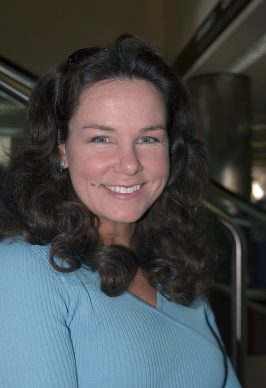
Jennifer Kambourian
What are the consequences of being single over 30 in the Church, that you observed, for men and women?
There was this parallel track that men and women seemed to be on up until about their mid-20s in terms of their activity in the Church, and the expectation that at some point they would meet someone and get married in the temple. As they got into their mid-late-20s, women who were still single were now moving into their career development years. What I saw was that their confidence really increased. I saw that men, unfortunately, began to lose a little bit of confidence. This is not true across the board, but I think it had a lot to do with the fact that there was a cultural expectation that they should be the assertive one, the aggressor in pursuing a spouse. There was the thought in some people’s mind of, “What’s wrong with you? Why aren’t you doing your priesthood duty? Why aren’t you getting married? You’re slacking off. You’re not doing your job.” Whereas the women were kind of absolved of that responsibility in our culture, so we could continue on and be active in the Church and there wasn’t as much of a sideways glance towards us because there was a sense of, “We know she’s trying.”
If a man is still single, I think sometimes we’re a little less forgiving. I hope that changes. I think it is changing, because there are a lot of complicated reasons why people don’t get married and I think that it’s unfair for anyone to ever make an assumption about why someone is still single.
To be fair, I really believe in my case I also remained single because on some level I was a little nervous about marriage. I had some see some things in my own parents’ marriage, I had seen some things in other marriages that were close to me and I took that pain to heart. I was a little nervous about getting into a marriage and then feeling, “Oh no, I’m really stuck now.” I wanted to be ultra-careful that I found a really good match where I believed I could have a high likelihood of a happy marriage. I’m certain that what took me so long to find a companion was my own fear. Fear of failure.
Did your parents stay together?
Yes they did. I will say that it was difficult. There was a period of time when I was about seven years old that they did separate. I want to be respectful of their privacy—I think a lot of it had to do with this issue of differing world views and different ideas about where they wanted their lives to go. Ultimately what held them together was two things. They really had a deep mutual love for each other, and truly wanted to be together. And two, their children. They really wanted to be together in raising their four daughters. I think they were both willing—especially my father—to make compromises. I’m personally thankful that they did stay together.
Just to skip ahead a bit, my father stayed out of the Church for 40 years, and then in his mid-70s he came back to the faith and was re-baptized. The family is now sealed in the temple. I think we all on some level knew that Dad would someday come back. Quite candidly, my patriarchal blessing and my mother’s patriarchal blessing (which she got as an adult woman in her marriage) both say that our father would rejoin the Church one day. And when he was 75 years old he finally chose to be re-baptized in our faith and was active in the Church until he passed away about 3 years later.
What were the compromises that he and your mom made for each other in order to stay together?
My mother was born and raised in a true-blue five generation Mormon pioneer family from Idaho. Her entire family were cut from that cloth. I know that Mom felt somehow she had messed it up because her husband hadn’t stayed in our faith. I know that it was difficult for her to bear the responsibility of raising all of the daughters herself in the Church. But she did. She brought us to church every Sunday. She modeled for us her faith in ways that were very powerful in shaping our testimonies—all four of the daughters are still to this day very solid members of the Church.
One of the compromises was that my dad drank alcohol, so we had alcohol in our home. He drank coffee. He would come home from work and have a beer while he watched TV at night. That was just normal life for us. I know that was very painful for my mother to have that in her home, but she also understood that it was Dad’s home too.
To her credit, Mom understood how important it was for us to have her show respect for my dad, and consequently that helped all of us respect him and his choices, even though we did not participate in those activities with him. In fact, her example is another reason that my own marriage works. And I don’t think she had role models. She managed it on her own. I’m in awe of that, that she figured it out.
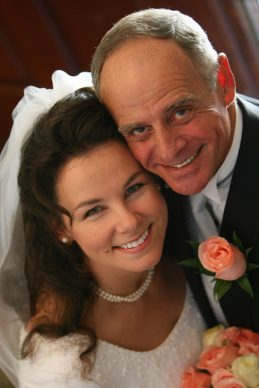
Jennifer and her husband John
How did you meet your husband John? What led you to the decision to marry him?
As I reached my mid-late-30s I still was absolutely determined not to marry out of our faith. I was a temple worker at the Oakland temple, and being at the temple every single week reinforced in my mind that that was not a negotiable thing in my life. What I found in my dating life, however, was that as I reached my late-30s (very understandably, and I don’t blame them at all for this), the men I was meeting at church and on LDS dating websites were pretty candid in letting me know, “Hey, you’re really a nice woman, and I like you a lot, but either A) I’ve already raised my kids, I do not want more children. Or B) I really want children, and at your age I just don’t think that’s realistic.” I got it, I understood where they were coming from, but that put me in a very interesting dilemma because my dating experience in our church ground to a halt. Hardly anyone ever was asking me out, and I think it had to do with this childbearing issue.
I began to realize that I couldn’t continue to live my life always “as if.” I had tended to live my life with the mindset that, “Ok, I will buy a home when I get married. I will start doing my traveling when I get married.” Somewhere in my late-30s I began to turn a corner and said to myself, “Wait a minute. I may not marry. If I don’t marry, I don’t want to just spend the rest of my life waiting for something to happen.” So I decided to take more adult measures to establish myself financially, and socially in my community, and professionally. As a younger single adult woman I tended to make short-term plans because I never wanted to shut any doors to anyone I might possibly meet to date. Professionally I didn’t progress as much as I might have. I waited a really long time to buy my first home. It’s kind of sad, but I really think that I equated retaining a certain level of emotional immaturity with being more viable for marriage.
When I made that shift in thinking and began to release myself truly as a fully adult woman, with or without a spouse—an adult, autonomous, Mormon woman in the world—I noticed I began attracting men again. Maybe there’s a lesson in that. I bought a home in Silicon Valley. I began making meaningful steps to expand my business, and my income increased accordingly.
My husband and his first wife were in the foreign service together. They had lived overseas their entire marriage and really had fascinating lives, both individually and as a couple. They had three children together. Then in her mid-40s she was diagnosed with an aggressive stage 4 terminal cancer. Within a year she had passed away. Before she passed, she told him that she would really like him to remarry.
About six months after she passed away, he turned a corner and felt that he wanted a companion and someone to raise the children with him. He was at work one day at the embassy in Brasilia, Brazil, having lunch with an LDS coworker and said, “I just feel something telling me that I need to start thinking about remarrying, but I don’t even know where to begin that process.” He was 53 years old at the time. His coworker, kind of offhandedly but with some seriousness, said, “Well John, you should marry a Mormon woman. Mormon women are amazing.” John said, “Well I love Mormons. I’ve worked with them all of my career in the foreign service. They’re always my best employees and some of my favorite people. Where do I find a Mormon woman?” She told him about LDS dating websites, and he set up a profile, stating up front that he was not LDS.

Jennifer’s husband John
On my end—and this is where the story gets a little dramatic—I had reached the point where I was coming to peace with the possible reality that I would never marry. I was now 42 and I actually wrote an email to my best girlfriend and said, “You know, I’m really okay with it. I finally feel okay that I probably won’t marry.” I started making some plans to go to graduate school and pursue another career path, and I just felt like life is going to be good anyway, even if I’m alone.
I thought, “Just for the fun of it, I’ll give it one more try on one of these dating websites.” I had not yet had success on those, so I put my name and my profile up and went to bed thinking really that nothing much was going to happen. The next morning I woke up and there was an email from John. I opened it up and I was intrigued because the first thing he said was, “I’m not LDS, but my friend from work recommended that I consider this, so I’m going to go ahead and do it. This is new for me, I’m a little nervous, but here we go.” He told me his story, about his wife passing, and showed me some photos of his family. In the past, whenever I would get an email or an invite from someone not of our faith, I would just put up a wall. I would say in my own mind, “No, I’m not even going there.” But when I read John’s profile and saw his photos, I did have a spiritual witness, and the thought that came to my mind very clearly was, “You need to pay attention to this.” We started emailing and within a day or two we were on the phone talking, and there was an instant affinity. There was this strong parallel of values, even though we had different religious faiths. He was raised Catholic; he was not active in the Catholic faith, but he was a deeply faithful, good man.
I have actually stopped telling people that we are of different faiths. I would say we are almost of exactly the same faith on the really important matters. We have different ideas of how that faith is administered and managed in our day to day: for me it means I go to church on Sundays, I wear garments, I go to the temple, I do family history, I hold callings. For him that faith takes the shape of being a good father, being a good husband, doing well in his work, being a very honest person in his professional life and in his personal life. I really try not to say, “He and I are not of the same faith,” or “we don’t share the same faith,” because the things that are common in our belief are actually pretty similar.
One week after that first email, I was sitting at my desk at home and looking at the photos he emailed me. I had a very powerful, visceral experience where it was really clear to me this is the person I’m going to marry. I began to cry because I knew with clarity, it was like pure light, pure knowledge. I wrestled with that because it was at odds with what I had planned for my life since I was 12 years old. It was at odds with everything I had read and seen in the temple, and heard and read in the Church. In that wrestling, I prayed. The answer that came to my heart and my mind was, “I want you to be at peace with this. I know the end from the beginning. I know what I’m doing. Trust me, and trust this process.”
I went to the temple with this and fasted and prayed, and the answer stayed the same. I spoke to a few people whose spiritual judgement and wisdom I really trusted and respected. They were very supportive. I had a long talk with a former bishop of mine who was now my friend, and kind of a father-figure to me in a spiritual sense. His view was, at almost 43 years old it was less and less likely that I would bear children of my own, and why not consecrate my life with the beautiful act of raising this man’s children with him, and give them the love that I have. He said really what this husband and these children needed from me wasn’t necessarily for me to convert them to our faith, but rather they needed my love, they needed my companionship, they needed my mothering, and they needed my intellect and my heart. Why not give that to them? Why not join with this family, marry this good man—who I had, by the way, really fallen in love with by this time. Why not share my life with this wonderful family and leave the rest up to the Lord and trust him when He said, “I’ve got this. You just go ahead and step out into this situation and I will take care of the rest as I see fit.” When my friend framed it to me that way, the answer was really easy for me. So I married him.
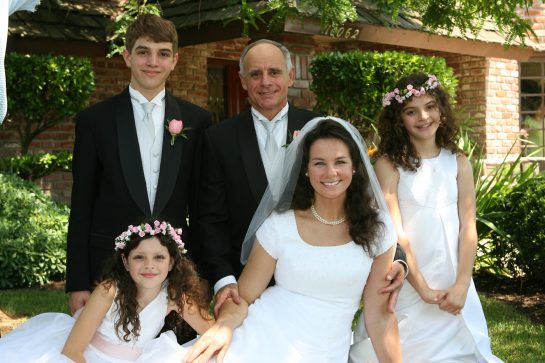
Jennifer with her family on her wedding day
We were married in California, just about a year after his first wife died. The children were ages 10, 13, and 15, two younger girls and a boy. It was certainly an adjustment for all of us. It was definitely a shock to my system to go from total autonomy to all of the sudden making meals for five, managing a household, taking care of getting the kids’ doctor appointments, etc. It was challenging, to say the least. Thankfully, John was an incredible support. Friends had warned me and told me it would take about three years before we felt like a family, and like clockwork it really did. Up until then, especially the first year, I felt like the interloper. I felt like they were the family, because they had their family culture and their family memories; the whole first year was a massive adjustment to all of us.
At the same time that we were making these adjustments, the kids and my husband were still deep in the grief process, which takes a lot of time. It does. I knew that experience was a process for them, and I knew that I could be there to love them and support them, but some of it just was stuff they had to work through while I was a bystander. And even though my husband was thrilled to be married to me, the first year of our lives together was also mixed in with his saying goodbye emotionally to his first wife. After the first year, I would say, we all got into the groove a bit more and began to understand the rhythm and the flow of this new family and this new culture.
We decided early on in our marriage the kids would call me “Jennifer” rather than “Mom” because we wanted them to know I wasn’t here to try to replace their mother. I really made a pointed effort from day one to be very receptive to the memories of their late mother. To that end, we actually have her ashes in our home. For the first three years of our family’s life together we would celebrate her birthday. We put cards and flowers by her ashes. We had dinner and I would make cake and the kids would talk about their mother and tell me little stories about her. I really believed that for their healing process, but also for our growth together as a family, I needed to see her and myself as co-involved in this family, and I needed to keep her memory alive in their minds and hearts.
It doesn’t mean that I was completely going to usurp my own personality and subsume myself into the memory of his first wife. It was a careful walk to be respectful of her role in our family but also to be able to assert my own self, my own personality in our home. There were times when I was able to do that, other times when I felt a little lost in all of this mix.
I don’t have a full understanding of how this will all play out in the eternities. But I have felt throughout my marriage, whenever my mind goes to that question of, “What’s going to be the eternal picture here? Will I be married to him? Will she be married to him? What’s the story here?” the Spirit, almost like the presence of a gentle hand putting its arm around my shoulder, speaks to my mind, “Be at peace with this. You do not need to worry about this question at this time. This will be resolved in a way that you will be very comfortable with it, and be happy and joyful.”

The Kambourian family
For now, the blessing of my life has been that I have a really good marriage and a beautiful family. I have a very sweet, loving relationship with each one of the children. A lot of what makes it a good marriage is that we have a deep respect for the autonomy of the other person to decide their belief system. Now, of course, there has to be enough overlap that we can be compatible in a day-to-day way. No, we do not read scriptures together, we do not pray together, we do not go to the temple together. But we go to the gym together in the morning, we go out to dinner together, we take walks, we talk, we watch movies, we both love to travel.
When we were dating and he proposed, I told him that the one thing I really need to know is that he would be able to be at ease with the level of commitment I have to my religious faith. I have seen friends of mine who married out of the Church and they thought it could work, and it did not work. When I look at the challenges that they had, usually it comes down to the non-LDS spouse not fully understanding what they were signing up for when they married a Mormon. They didn’t understand how involved we are in our church. I explained to John before we married how much time I spend at church, how much time I spend in calling, how much my church and my religious faith infuse every facet of my being and my life. So I think he had a really good picture of how much my church means to me well before we were married. He is a very secure man within himself and is willing to let me have the life I need to have, and that’s why it can work.
I think, quite frankly, the other reason it works is that I didn’t have a child with him. I have often wondered if our marriage would have worked, because when you get to that point where you’re taking that child to church and primary and getting baptized, he and I would have had to have some real conversations about what faith are we going to raise this child in? I think that would have put some strain on our marriage. I’ve had a lot of single women come to me from church and say, “Jennifer, you’re in a really happy marriage and you’re married to a non-member. Would you advise that I do the same?” I’m always really candid with them and tell them, “Look, if you think you’re going to have children with this man, or if you already have children and you want to marry out of the faith, make sure he understands you want to raise your children in the Church. Because if he wants to raise them out of the faith, and you want to raise them in the faith, the marriage will not work.” Maybe someone has a different opinion, but I really believe that is where the big problems come in.
And I think the non-believing spouse has e very right to say, “I want my children raised in a different way,” I don’t think it’s fair for me to marry someone and then impose my beliefs on him and tell him that any children we have together are going to be married in the Mormon church whether you like it or not. I feel strongly that both spouses have to understand and agree to the arrangement before the marriage occurs, or the marriage is in trouble.
I have certainly exposed the Church beliefs to the kids; my step-children have all come to church with me at different times, they know the basis of our beliefs, they know what our church is about. None of them have chosen to be a part of our faith, and that’s okay because I love them as they are. I love my husband as he is. I never want any of them to feel that my love for them is conditional on their joining the Church, or that somehow I would love them more if they joined, or that we would be happier as a family.

The Kambourian family
Early on in our marriage, I was prayerful about how much proselytizing I should do towards this new family. I got a very direct answer that I was not to overtly try to proselytize my family into joining the Church, but rather I was to just love them. Just love them, be a good mother, a good wife, a good companion, a good partner, and find joy in this beautiful family, and not have this undercurrent of always trying to convert them. I will say that if I had that secret agenda, it would have damaged my marriage, it would have damaged my relationship with my step-children, and I again, think that is where sometimes mixed-faith marriages run into difficulties.
The compromises I’ve made are similar to the ones my mother made. My husband drinks alcohol and he has wine in our home. He’s not a heavy drinker, but I am always respectful of his choice. That’s his thing. I don’t drink wine and that’s my thing. He is respectful of my beliefs; he is supportive of my activity in the Church. At times he’s even helped me in some of my callings. He sees the pleasure and the joy and the sense of meaning that I derive from my faith. He’s very respectful of my temple worship, very respectful of my garments. All of this works because we have, at our core, a deep respect for the fact that each of us is a good person of faith. We have a different way that we explicitly live our faith, but we are both people of faith.
Have there been moments of tension around the issue of faith?
I only remember one time, about five years into our marriage. We were driving on a long trip, and I was really curious to understand at a deeper level what my husband believed. I began asking him, “What do you think about the afterlife? What do you think about eternal marriage? What do you think about baptism by immersion?” And quite candidly, we agreed on everything. Then I said sort of the golden question which was, “Well then, if we agree on everything, would you consider joining the Church?” And he found that very offensive and hurtful. He feels deeply connected to the Catholic faith, even though he does not actively go to the Catholic church. He was born Catholic, raised Catholic, went to the Catholic school, and he knows the Bible better than I do. In his DNA he feels like he is Catholic. So for me to say to him, “Since we pretty much share almost all the same beliefs, why not just join my church?” that felt like a rejection of him and who he is, and it felt disrespectful to him. I never did that to him again.
We focus on the areas of overlap, the beliefs we share. And we just don’t worry about the rest. Even my LDS friends who are married in the temple have areas that they don’t completely have the same view on certain things, and they still find a way to make it work. That’s where we are too. I think that both of us have a strong belief in the Savior, Jesus Christ, and we both have a strong belief that when that day comes that we meet the Savior, all of the mysteries that we don’t yet understand will be made known to us. A lot of the things that we perceive to be big differences of opinion in matters of religion, John and I both believe will just melt away.
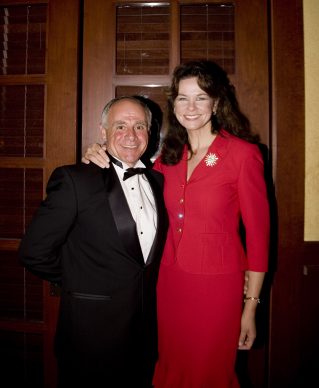
Jennifer and her husband John
It’s a gift that you have to be able to fully honor and respect his path this way. Do you think that is related to the independent testimony you were forced to develop in your family growing up?
Absolutely, yes. My faith was challenged directly in my home from childhood. I remember as a little child coming home from primary with a picture of Jesus that I had done in crayon, and my dad would ask, “How do you know there’s a Jesus? How do you know he was really a god?” I was hearing that at 8, 9, 10 years old. I had to stop and think, “How do I know?” It required of me to go through the process of not just accepting on faith, but really working through the deep questions of Joseph Smith and some of the things he did that seem odd to our ears in modern day, and some of the questions that we have about why did the Church do certain things a certain way for a while, and now they do things differently.
So often the things we perceive to be a big trial in our life, down the road turn out to be exactly the medicine we needed. My dad was a brilliant man. He was a PhD in Psychology, and a college professor in economics and psychology. He knew his stuff, he knew his history, he knew his Mormon history. He presented me with some really well-crafted reasons for why I perhaps should not believe in this church. For years I thought that it was such a trial to have this non-member father who was so antagonistic towards the Church, but the blessing of it was that it inoculated me, in a sense, by exposing me to those ideas at an age that I was able to work them out. It gave me tools and a process for working through subsequent times of doubt, and at times very sophisticated challenges to my faith. So yes, absolutely. The things I learned in my home environment are a direct reason that I can say that my marriage is successful.
The other gift that my home environment gave me was a great empathy and openheartedness towards those of different belief systems, whether it’s different faiths, or non-faith. It taught me from a very early age to relate to and understand the perspectives of people who were not in the fairly insular Mormon belief system that I sometimes encounter. It taught me how to be at ease with people of various faiths and be very respectful of where they’re coming from, and not operate from the perspective of befriending them just because I want to convert them. In fact, I think that’s not fair to them, and I think it is actually disrespectful to people to approach them in a friendship with this subterranean desire that, “Oh I’m going to be their friend so I can convert them.” No. I’m going to be their friend, I’m going to share what I have as it comes up organically, and I’m going to be a good friend to them whether or not they ever choose to adopt the faith that I have chosen to live.
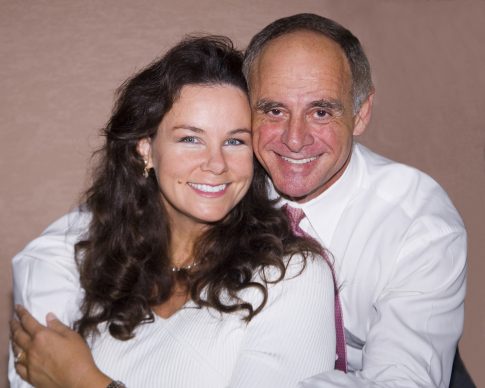
Jennifer and John
Has your relationship with Christ or your relationship with the gospel changed because of your marriage to a non-member?
I have found that it is in the context of marriage and being a mother that my understanding of how much our Heavenly Parents and our Savior loves us has deepened immeasurably. I want to be careful about saying this because I would never want that single person out there to read this and think, “I guess I won’t be able to learn those things because I’m not married.” I do know that the Lord has many different ways he can teach each one of us the same lesson. But for me, even more than being married to someone out of the faith, being married period and having children has profoundly expanded my understanding of my relationship with God. My sense of the vastness of the Gospel of Jesus Christ has really been magnified as I have been able to be in a family.
At A Glance
Name: Jennifer Gibbs Kambourian
Age: 55
Location: Northern Virginia
Marital History: Married since 2006
Children: Three step-children, ages 27, 25 and 22
Occupation: Small business owner. I own and run a swimming school.
Schools Attended: Brigham Young University
Languages Spoken at Home: English and Spanish
Favorite Hymn: "Carry On"
Website: SwimWithJennifer.com
Interview Produced by Meredith Marshall Nelson
